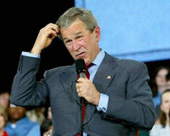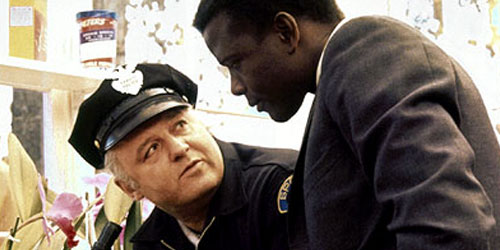In the 1967 version of In the Heat of the Night, there is a scene where the white police chief Bill Gillespie (played by Rod Steiger) turns to the black detective Virgil Tibbs (played by Sidney Poitier) and says, “Well, you’re pretty sure of yourself, ain’t you, Virgil. Virgil, that’s a funny name for a nigger boy to come from Philadelphia! What do they call you up there?”
Virgil replies, “They call me Mister Tibbs!”
That moment isn’t significant simply because a black man is defending himself. A line like that is more important in a larger perspective because it was a sign that things were beginning to change. Tibbs didn’t attack Gillespie, he didn’t play the race card, and he didn’t play into any stereotypes. He just defended himself as any human being would.
I don’t think our current presidential race is really about the candidates. I honestly believe that no matter who gets elected, they’re still a puppet controlled by the hand of the government. Sometimes that hand is controlled by the people, sometimes by Congress, and sometimes by the natural forces of society. But the candidate is still a puppet. No matter what their stances are or their personal beliefs, they’re still the leader of ALL of America. They have to make decisions as a leader that they would never make as an individual, and that’s okay because that’s part of being a servant of the people. But they are not the supreme leader that rules this land (like a dictatorship), they are the representative of the people and their needs and desires.
This is important because bullshit “stances” (like where they fit on abortion, gay marriage, the war, etc.) are just that: bullshit. Who cares what the president’s personal beliefs are? If he says red is the best color, all the blue lovers out there would immediately dislike him. I know that’s an oversimplified way to look at it, but not by much. It is absolutely impossible for people to agree on any issue, much less important or controversial ones. The president is here to represent us all, not just my beliefs or your beliefs. As long as they attempt to bridge the gap between the millions of differing opinions, they’re doing their job. And (not to give the pro-war fans any fodder) who knows what information the president has access to that the people will never be given access to? This privileged position dictates that once the president is sworn in, they stop being an individual and start being the head of the entire political body…which is just fine by me. After all, this is still a democracy, right?
 Getting to my point, the elections this year are important to me for a specific reason: it’s a barometer for the nation’s mental health. When Bush was elected in 2000, it really didn’t bother me much because the choices were so unclear. I was annoyed, sure, because it seemed like we elected a guy mostly based on the fact that his last name was the same as another (incredibly unsuccessful) president. I mean, really, people mostly voted for Bush because they didn’t like Gore, not because they actually liked or believed in Bush. Most people who voted against Gore did it because he was tied to Clinton, and there were a lot of Clinton-haters on that side of the fence. So our nation was petty? Big deal.
Getting to my point, the elections this year are important to me for a specific reason: it’s a barometer for the nation’s mental health. When Bush was elected in 2000, it really didn’t bother me much because the choices were so unclear. I was annoyed, sure, because it seemed like we elected a guy mostly based on the fact that his last name was the same as another (incredibly unsuccessful) president. I mean, really, people mostly voted for Bush because they didn’t like Gore, not because they actually liked or believed in Bush. Most people who voted against Gore did it because he was tied to Clinton, and there were a lot of Clinton-haters on that side of the fence. So our nation was petty? Big deal.
However, when 2004 came around, the world was completely different. We’d gone through the greatest series of crises since the Vietnam War and begun an obviously controversial war that was perpetuated by pure fear. He was clearly incompetent, too stubborn to be a decent leader, and ruled over possibly the most corrupt administration ever. (I know what you’re thinking, and before you jump on me, let’s just wait until history reveals the truth.) More people apparently liked Bush than disliked him, even though the streets were filled with people protesting the war for months. I mean, if over half of the voting population elected him and his approval rating is so consistently low, it means that there was a huge portion of people in our nation that voted for the wrong person. It didn’t bother me that We the People chose the incompetent incumbent over the charmless challenger, it bothered me that we were making that choice based on the wrong things: fear and paranoia.
![]() And so, these days it doesn’t bother me at all when people tell me that Obama has received contributions from special interest groups. You know why? All politicians do it. Yes, even Ron Paul. (His base is the very essence of special interest.) People complain about the apparent lack of substance in this election, but how does that distinguish this election from any other? Everyone talks about idealistic and abstract things while on the campaign trail. That’s how it works.
And so, these days it doesn’t bother me at all when people tell me that Obama has received contributions from special interest groups. You know why? All politicians do it. Yes, even Ron Paul. (His base is the very essence of special interest.) People complain about the apparent lack of substance in this election, but how does that distinguish this election from any other? Everyone talks about idealistic and abstract things while on the campaign trail. That’s how it works.
The truth is, I really don’t care about the individual candidates. Voting is about the voters and will of the people, not the individual candidates and speculation about what they might do once in office. I mean, if everyone would’ve known how huge of a mess the war was going to be, do you really think Bush would’ve been elected? What really matters in an election is what the voters think, not the candidates themselves. Voting is a barometer for our hopes, fears, wants, needs, dreams, and nightmares. And in 2004 we forgot our about our hopes, wants, and dreams and cowered to our fears, needs, and nightmares. After this several-year-long downhill slide, I almost lost faith in America, and I became a genuine advocate for Stephen Colbert for president. I figured that if the electoral system was a joke, why not elect a comedian?
![]() But now that Obama is in the race and the people are starting to rally behind him, I’ve started to feel that hope in humanity I’ve been missing for so long. Of course, there are a lot of people who are voting for him simply because he’s black, a Democrat, not a Republican, from Illinois, good-looking, charismatic, or some other arbitrary reason. But many people are rallying behind the “Yes, we can!” mentality, and that’s what really matters to me. There will always be those jaded people who feel compelled to disparage hope and idealism. I pity these people. Anyone who mocks idealism is too jaded for their own good. What is the point of hope if not to inspire?
But now that Obama is in the race and the people are starting to rally behind him, I’ve started to feel that hope in humanity I’ve been missing for so long. Of course, there are a lot of people who are voting for him simply because he’s black, a Democrat, not a Republican, from Illinois, good-looking, charismatic, or some other arbitrary reason. But many people are rallying behind the “Yes, we can!” mentality, and that’s what really matters to me. There will always be those jaded people who feel compelled to disparage hope and idealism. I pity these people. Anyone who mocks idealism is too jaded for their own good. What is the point of hope if not to inspire?
Clinton would be an excellent choice, but I fear the pseudo-support that comes from the meaningless legacy vote (just like Bush in 2000). McCain would also be a great choice because he’s honest and reliable, but even a sturdy train is dangerous when it’s riding on uneven tracks. But I have been watching Obama since I first saw him campaigning for the House of Representatives in 2000. I remember thinking, “That guy should run for president.” And when he gave the keynote address to the Democratic National Convention in 2004 I thought, “Obama is going to run for president.” Now, every time I listen to him speak, read about him, or see how my brothers and sisters of America react to him, all I can think is, “Barack is going to be president!” If voting is the barometer of the people, then it looks like the clouds of fear and paranoia might be starting to break. The candidates could all be four-armed axe-wielding Gorläg demons for all I care, as long it means that America is finally doing something about its problems rather than simply complaining about them, or worse, pretending that everything is just fine.
Are there things about Obama I don’t like? Oh, sure. Are there things he believes in that I don’t agree with? Absolutely. Will he be the best choice for president? Possibly. Will he only make decisions that I agree with? No way. But, will I encourage people to vote for him? With every tool I have at my disposal. Why? Because I have faith in humanity, and I would be a hypocrite if I didn’t vote for hope.
